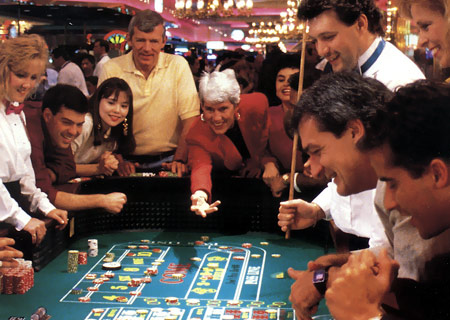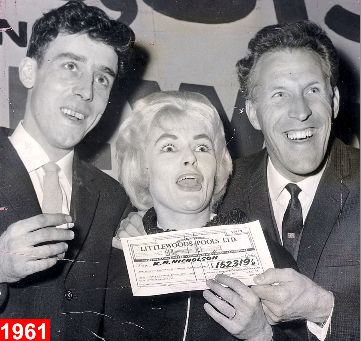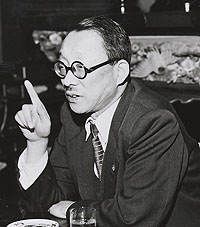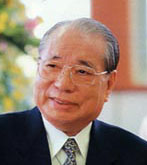
Welcome to the ezine produced by SGI Buddhists that prompts the positive, kindles the constructive, highlights the hopeful and leaves you feeling - well, up!


The Buddhist principle of The Ten Worlds holds the key to living a truly rich life, says Eddy Canfor-Dumas
Money can makes us suffer in the World of Hell, for example. And I don’t mean the lack of money, but actually having it. This 'hell of wealth' was noted by psychologist Oliver James in his controversial book Affluenza, a term he uses for a condition that he describes as follows:
The Affluenza Virus is a set of values which increase our vulnerability to emotional distress. It entails placing a high value on acquiring money and possessions, looking good in the eyes of others and wanting to be famous. Just as having the HIV virus places you at risk of developing the physical disease of AIDS, infection with the Affluenza Virus increases your susceptibility to the commonest emotional distresses – depression, anxiety, substance abuse and personality disorder (like ‘me, me, me’ narcissism, febrile moods or confused identity).
A little later in the book he notes that:
The definitive World Health Organisation study of rates of emotional distress in fifteen different nations…revealed that over one-quarter of Americans had suffered from some form of emotional distress in the previous twelve months, whereas only one-sixth as many indigenous Nigerians had. Despite being the second wealthiest nation in the world, over forty times richer than Nigeria, America is by some margin the most emotionally distressed of all nations.
And he tells a story of a wealthy lawyer he once met who characterised his life thus: ‘My goal is to keep earning for thirty years, educate the kids, pay for my daughter’s wedding – and then die.’
I’ve also seen in some people a differently hellish attitude – a kind of fear or even hatred of money. This stems, I suspect, from a deep or even subconscious fear that having money will corrupt them in some way. Living as we do in a country whose attitudes have been so heavily influenced by Christian teachings, I wonder if the idea that ‘The love of money is the root of all evil’ might not lead some people to feel that maybe the hatred of money can be the root of all good.
 The relation of the world of Hunger to money is more obvious – we want it, desire it, crave it. Fundamentally, though, people who are dominated by this life condition do not really want the thing they are craving. Rather, they want to fill a vacuum at the centre of their lives, and fix on money – or drink or drugs or sex or serial relationships or any one of a number of things – as the means to fill that vacuum. True gamblers, for example, don’t really want to win a lot of money. Rather, they are addicted to uncertainty - to the excitement that comes from the chance of winning and, equally, losing a lot of money. How many gamblers, for example, settle down after a big win to live quietly in the suburbs?
The relation of the world of Hunger to money is more obvious – we want it, desire it, crave it. Fundamentally, though, people who are dominated by this life condition do not really want the thing they are craving. Rather, they want to fill a vacuum at the centre of their lives, and fix on money – or drink or drugs or sex or serial relationships or any one of a number of things – as the means to fill that vacuum. True gamblers, for example, don’t really want to win a lot of money. Rather, they are addicted to uncertainty - to the excitement that comes from the chance of winning and, equally, losing a lot of money. How many gamblers, for example, settle down after a big win to live quietly in the suburbs?
One can see this in a man such as Robert Maxwell. Restless, lonely, never really satisfied, as soon as he closed one deal he would be off hunting the next. Having attained what he so desperately wanted, he seemed quickly to tire of it – and would have to go after more. Until, like Monty Python’s Mr Creosote, everything exploded.
 A good example I can call to mind to demonstrate the world of Animality in relation to money is Viv ‘Spend, Spend, Spend’ Nicholson. She and her husband won the pools, and Viv spent, spent, spent until the money was all gone. And at the end she had nothing to show for it. Foolishness.
A good example I can call to mind to demonstrate the world of Animality in relation to money is Viv ‘Spend, Spend, Spend’ Nicholson. She and her husband won the pools, and Viv spent, spent, spent until the money was all gone. And at the end she had nothing to show for it. Foolishness.
For people dominated by Anger, in the Buddhist sense, money is essentially a means of keeping score. This can be seen in the fictitious Gordon Gekko, whom I quoted earlier, who used money as a weapon, as a means of fighting and winning in the corporate game, and to show others who is king. For a while, believe it or not, he actually became a capitalist icon.
The world of Humanity in relation to money is the world most of us can probably recognise quite easily. It’s where we do the sensible thing – we make a budget, live within our means (more or less), would like a bit more money but aren’t really fussed enough to do anything about it, except perhaps daydream (and play the lottery). It’s where we’re level-headed, realistic and basically prudent – but are still prey to the temptations of our materialist society.
 Money causes the world of Rapture to appear in us when it comes unexpectedly – as if from heaven – or at just the right moment, or as the reward for our efforts or talents. Or when we realise that thanks to this money we can fulfil some personal desire. So Rapture is when money makes us feel good. But it doesn’t last.
Money causes the world of Rapture to appear in us when it comes unexpectedly – as if from heaven – or at just the right moment, or as the reward for our efforts or talents. Or when we realise that thanks to this money we can fulfil some personal desire. So Rapture is when money makes us feel good. But it doesn’t last.
Viv Nicholson was in rapture when she and her husband won the pools. She kept on spending the money in a vain attempt to sustain that rapture. And in her example we can read the basic trend of our time, according to this analysis by Daisaku Ikeda:
From the Buddhist viewpoint, we might say material culture that encourages the proliferation of desires has as its aim the creation of the state of Rapture. Certainly many people, though perhaps unconsciously, regard the state of Rapture, presented by material affluence, as an ideal condition.
To carry on the analogy, the aim of Western materialistic culture appears to be to employ all the means of science and all the resources of the earth to build palaces for this state of Rapture.
In the days when the futurologists were still predicting a rosy future for humankind, it seemed almost as though this were being accomplished, but now we are beginning to see that the palaces were built on sand. Today they seem on the verge of collapse, along with the civilisation that built them. What it amounts to is that we have traded spiritual affluence for material affluence (Life: An Enigma, a Precious Jewel; written in 1982).
And, as he has highlighted elsewhere, the distribution of that affluence is grossly unequal.
If you do think about money in a detached, intellectual sort of way, it is working to reveal the worlds of Learning and Realisation in you. A student imbibing economic theory from a textbook is a good example of the world of Learning.
John Maynard Keynes, who wrote that student's textbook from his direct observation of how economies actually work – or at least, how he thought they did – is a good example of the world of Realisation.
 Money, in the world of Bodhisattva, is used to alleviate suffering. Jeff Skoll, first President of eBay, left the business world at the age of 35 with a reported $2 billion in his pocket and began to devote his time and money to charitable causes.
Money, in the world of Bodhisattva, is used to alleviate suffering. Jeff Skoll, first President of eBay, left the business world at the age of 35 with a reported $2 billion in his pocket and began to devote his time and money to charitable causes.
He used part of his fortune to found Participant Productions, which makes films that address social and political issues and create positive social change. For example, Al Gore's documentary about global warming, An Inconvenient Truth, was funded by Participant. Skoll believes that it’s in everyone's interest to shift the overwhelming imbalance between the ‘haves’ and ‘have-nots’ in order to bring about a more peaceful world. ‘Business skills, when well applied,’ he says, ‘can do more than just make money. They can potentially make money and do some real good, which is immensely satisfying.’
 What, finally, of the world of Buddhahood? The Buddha’s attitude to money can be best gleaned, perhaps, from a selection of quotations and observations. For example, Josei Toda, second president of the Soka Gakkai in Japan, used to liken money to the air that we breathe. ‘It’s all around us,’ he used to say. ‘The problem is, some of us are asthmatic.’ The solution therefore, he explained, is to develop healthy lungs – which is to say, the life condition of Buddhahood. He described it in these terms:
What, finally, of the world of Buddhahood? The Buddha’s attitude to money can be best gleaned, perhaps, from a selection of quotations and observations. For example, Josei Toda, second president of the Soka Gakkai in Japan, used to liken money to the air that we breathe. ‘It’s all around us,’ he used to say. ‘The problem is, some of us are asthmatic.’ The solution therefore, he explained, is to develop healthy lungs – which is to say, the life condition of Buddhahood. He described it in these terms:
It is like lying on your back in a wide open space looking up at the sky with arms and legs outstretched. All that you wish for immediately appears. No matter how much you may give away there is always more. It is never exhausted. Try to see if you can attain this state of life.
Nichiren described the same life condition in different terms. ‘A truly wise man,’ he says:
…will not be carried away by any of the eight winds – prosperity, decline; disgrace, honour; praise, censure; suffering and pleasure. He is neither elated by prosperity nor grieved by decline. The heavenly gods will surely protect one who does not bend before the eight winds (The Writings of Nichiren Daishonin vol 1, p. 206).
When the Buddha has money he – or she – uses it to create the maximum possible value. When he doesn’t have money, he is naturally supported and protected by his environment, including those people around him who recognise his true worth. Viewed from a deeper perspective, he actually uses his apparent misfortune as a means to teach others the benefit of Buddhist practice – namely that they can overcome any suffering and emerge stronger, more courageous, compassionate and wiser people as a result. Josei Toda’s businesses went bust, for example, and his spirit in the face of this adversity was a key inspiration for his successor, Daisaku Ikeda.
Moreover, Buddhahood can help us to determine how much money is ‘enough’ for us to be happy. This is because Buddhism teaches that we are happiest when we have discovered our ‘mission’ – our unique, fundamental purpose in life – and are engaged in carrying it out. We will almost certainly need money for that mission but the amount will be determined by its nature and scope. The key, though, is that the money is secondary to the mission and is used to support it. Any excess above the amount needed is, from a Buddhist perspective, superfluous to one’s happiness.
Finally, when a large number of people base their attitude towards money on their inherent Buddhahood, quite naturally their society comes to reflect their altered priorities, where the ‘treasures of the heart’ dominate – including gratitude, appreciation and the desire to relieve suffering, not cause it through rapacious greed.
 The words of Daisaku Ikeda again:
The words of Daisaku Ikeda again:
The Indian poet Rabindranath Tagore said: ‘It is the mission of civilisation to bring unity among people and establish peace and harmony.’ I believe that it will be the ‘third civilisation’, an ideal we [in the SGI] are striving to realise, that will achieve these goals. Neither spiritualism nor materialism alone is the answer. We have entered an age in which the world is seeking a third way, based on the philosophy of the non-duality of the spiritual and the material, or the oneness of mind and body.
As I hope you will have gathered from this essay, the Buddhism of Nichiren has a humanistic, broadminded and – I feel – totally realistic attitude towards money. It doesn’t worship it, but it doesn’t see it as evil either. Fundamentally, it says, money is neutral, a part of our environment, and as I’ve tried briefly to show in my description of the Ten Worlds, ultimately money reflects the life condition of those who use it. Nichiren explains that:
…if the minds of living beings are impure, their land is also impure, but if their minds are pure, so is their land. There are not two lands, pure or impure in themselves. The difference lies solely in the good or evil of our minds (WND-1, p. 4).
Money is not the root of all evil, says Buddhism – we are. But we’re the root of all good, too. And we can manifest the greatest good, I believe, in all areas of our lives, by chanting Nam-myoho-renge-kyo. So if you haven’t tried chanting Nam-myoho-renge-kyo, why not give it a go?
After all, it won’t cost you a penny.

